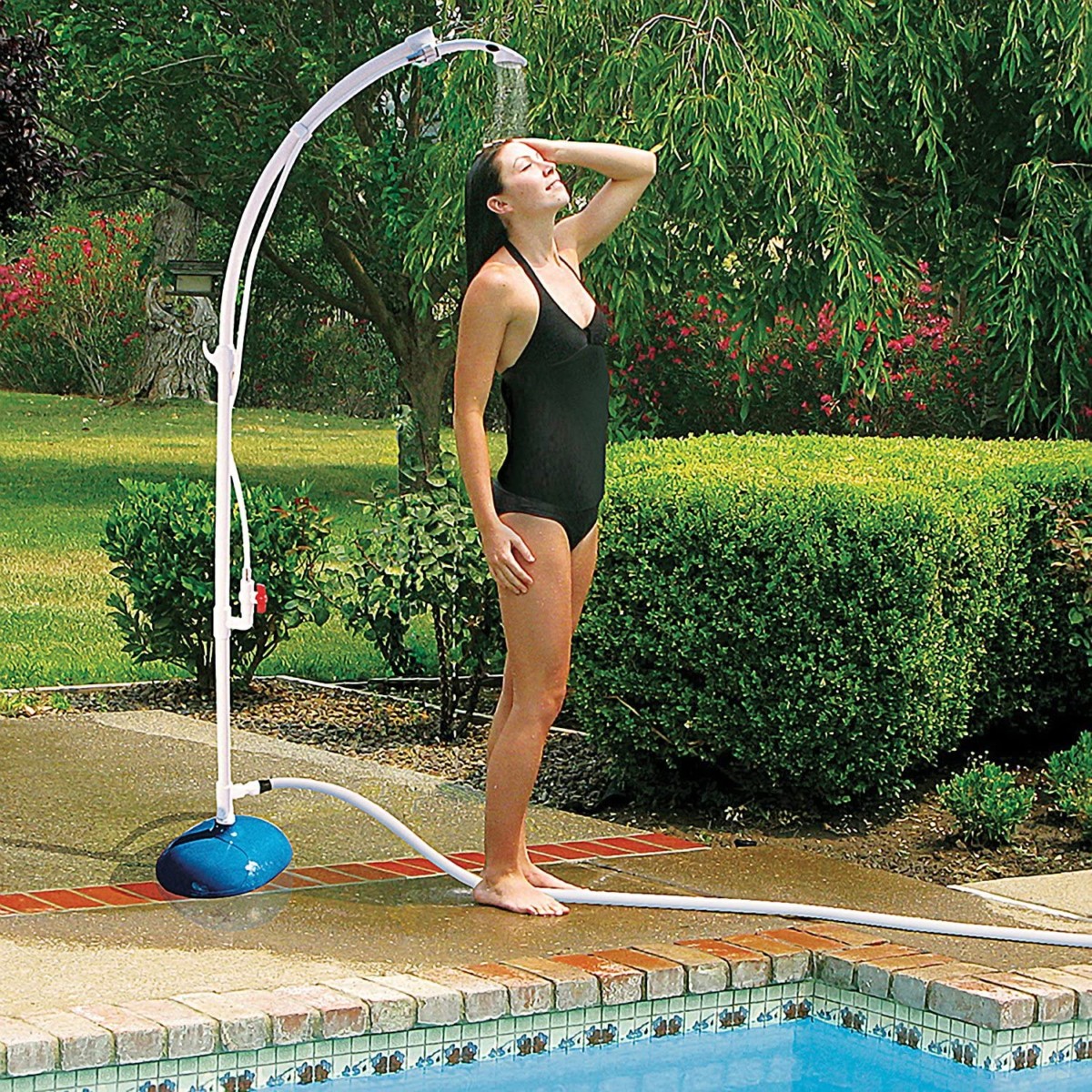There are more and more reasons these days to clean up, especially when there are known factors that can be transferred from activities like swimming in a pool in the summertime. Your swimming pool is like taking a bath with a bunch of people who can expose you to nasty bacteria that can make their home even in a well-maintained pool. Should swimmers shower off before and after a swim in your pool?
Yes:
- Taking a shower before you go swimming can reduce the number of undesirable contaminants added to the pool like sweat, perfumes, deodorants, Sun Block & Suntan lotion
- Taking a shower after, can alleviate exposure to RWIs, Chlorine, & Chlorinated by-products that are passed on by other swimmers
Even though your pool is well maintained, and balanced, and the pool water is crystal clear some microorganisms are more resistant to chlorine than others, so there is still a chance that you could get sick by contact with them in the water, even if the chlorine levels are properly maintained.
Should You Shower Before and After a Swim
The Interaction Between Body Oils, Sweat, and Chlorine: When chlorine interacts with substances like sweat, body oils, and cosmetics, it can form chloramines. These chloramines are responsible for the typical “chlorine smell” and can irritate your eyes and skin.
Surprisingly we all have small amounts of fecal matter on our bodies on any given day. On average, the (CCD) U.S. Center for Disease Control and Prevention estimates people have 0.14 grams of fecal matter on their bodies throughout the day.
Swallowing even a small amount of water with fecal matter has the potential to make you sick. When swimmers shower, they prevent the risk of recreational waterborne illnesses that cause diarrhea, skin infections, and eye infections.
Taking a shower with soap removes numerous substances that you carry with you on a daily basis that affect the water quality and health of the other pool users. Some of these include cosmetics, lotions, body oils, perspiration and traces of urine and fecal matter.
If you are swimming in the lap pool for an hour or just sitting in the hot whirlpool to relax, showering before is very important. You are not only protecting yourself, but the other swimmers from illnesses. Swimmers ear, skin infections or irritations, and respiratory issues are all things you can get from swimming in public pools where occupants do not shower before entering.
EPA recommends:
- Don’t swim if you or your kids have Diarrhea-If you or your children swim either if they have diarrhea since swimming will only help spread germs in the water and make others sick. Try and avoid swallowing pool water. This is sometimes easier said than done with little kids, but you have to teach them at an early age. Good hygiene practices are essential in and outside the pool.
- Take a shower Before & After swimming.
- Take your kids on bathroom breaks or diaper checks often even if they don’t mention the need to relieve themselves. By the time you hear “Mommy, I have to go”, it might be too late.
- Change diapers in a bathroom or diaper-changing area. Please don’t change them at the poolside. Above all, please wash your child thoroughly (especially the rear end) with soap and water before swimming. Sounds simple, right? It’s common sense. With some simple steps, you can protect yourself, your family, and your friends
- If you only remember one thing from this article just remember when you are swimming in a pool don’t swallow the water.
Showing After a Swim:
- Removing Chlorine and Other Chemicals from Your Body: Post-swim showers help to rinse off chlorine and other pool chemicals, reducing their impact on your skin and hair.
- Preventing Skin Irritation and Dryness: Regular post-swim showers can help in maintaining skin and hair health.
- Hair Care Post-Swimming: Using a good shampoo and conditioner after swimming can prevent chlorine damage to your hair.
Now that you know what can happen if organic material from swimmers’ bodies gets into the pool water, it should not surprise you that it’s a good idea to shower after exiting the pool. Showering will get rid of the chlorine and any foreign agents you may have picked up from the pool. Make sure to rinse your hair and wash your swimsuit after you swim.
Showering after you swim will keep your skin from becoming dry. You don’t have to worry about picking up a germ, and you’ll get rid of that chlorine smell. It only takes a few minutes to shower, so make sure you make it a priority. You shower after jogging or lifting weights — think of swimming in the same way! Just because you’re in water doesn’t mean you’re not working up a sweat.
Water Illnesses From a Recreational Water
Recreational Water Illnesses (RWIs) such as skin infections and parasites, can be spread in swimming pools by swallowing or coming in contact with contaminated water. Luckily, showering before and after swimming is actually one of the best and easiest ways to protect yourself and others from illness. If you don’t shower before swimming, you allow fecal matter to mix with the pool water.
Taking a shower before you go swimming can reduce infections transferred to other swimmers. Taking a shower after you have been swimming can alleviate germs passed on by other swimmers.
Diarrheal Illness is the most common illness that is prevalent in swimming pools. If a swimmer has had diarrhea in the last two weeks then that person stands to infect everyone else that uses the pool with germs. The main cause of this infection is a germ called Cryptosporidium, Giardia, Shigella, norovirus, and E. coli.
These bacteria can live for minutes and up to days in a well-maintained swimming pool no matter how clean it looks. Taking a shower after you have been swimming can alleviate germs passed on by other swimmers.
“Hot Tub Rash” is an illness that is caused by Pseudomonas Aeruginosa which is a germ that lives in dirt. The rash occurs when the person in the pool has contact with it for long periods of time. The symptoms look like bumpy red spots and are normally worse when the swimmer is wearing a bathing suit and is covered up. They could last a few days.
Ear Infections come from being underwater and leaving the water that is contaminated in your ear for a few days afterward. It is sometimes referred to as “Swimmers Ear” or your Doctor will call it otitis externa, Symptoms show up within a couple of days and the person’s ear will itch and swell and the itch will turn to pain when any pressure is placed on the ear. I had one of these guys when I was a kid and the Doctor’s treatment is not so pleasant either.
Respiratory Infections are another risk that the swimmer faces by breathing steam or mist from the pool or hot tub. A respiratory disease caused by the germ Legionella is one of the most frequent waterborne diseases (drinking water and recreational water)
Chemical Irritation in the Eyes and Lungs is caused by a by-product of chlorine and the sweat off the swimmer’s bodies (Nitrogen) that create chloramines that you may find in your swimming pool. If you are thinking of using the swimming pool at the campsite this year, you may want to take a whiff of it first.
If you smell chlorine coming from the pool and there are a lot of people using it, you may want to put it on hold and keep the kids out. Chloramines are what you are most likely smelling. A well-maintained swimming pool won’t have a strong chlorine odor coming from it. Chlorine mixes with the nitrogen coming off the people in the pool and creates a gas that is a lower form of chlorine.
Swimming Pool Shower Etiquette
Showering before you swim is important to the health of other swimmers.

- Reducing Contaminants in Pool Water: A pre-swim shower helps wash away many of the substances that react with chlorine, thus reducing the formation of chloramines.
- Personal Hygiene and Public Health: Showering before swimming is a gesture of respect towards fellow swimmers, contributing to a cleaner and more hygienic pool environment.
- Pre-Swim Shower: A Courtesy to Fellow Swimmers: It’s about being considerate to others who share the pool.
Installing a device for showering at your pool before and after swimming is actually one of the best and easiest ways to protect yourself and others from illness.
Despite this, most people don’t shower before and after hitting the swimming pool the majority of Americans (93%) would never reuse someone else’s bathwater, but more than 40 percent don’t shower before entering the pool, according to the Water Quality and Health Council.
Not only does a shower clean off any dirt you are carrying around with you but it will rinse off sweat, perfumes, deodorants, and Sun Block and Suntan lotion you put on while you are at the pool. People lotion up their whole bodies and, after they get hot jump into the pool.
Folks that bring babies into the swimming pool can have fecal material that is on the baby’s bottoms that a simple rinse can clean up and won’t contaminate the other swimmers in the pool.
Showering and Swim Lessons
Showering before and after you swim can keep you safe, especially when taking Swimming lessons where there are other people swimming in the pool.
Most of these things contained organic compounds within them. When organic compounds are mixed with chlorinated water, by-products are created. These by-products create gases called chloramines. After a while, there is less and less disinfection going on and free chlorine levels drop inside the pool water.
A simple rinse-off at a pool shower, before you dive in, can prevent that from happening. This is a nice shower setup for an inground or above-ground pool that is portable and easy to install.
You should shower after you swim until you can’t smell the chlorine on your skin. It’s important to shower after any water activities shower until you can’t smell the chlorine on your skin
Available here through Amazon get one for your pool. Wooden Outdoor Shower, Stand Portable Mobile Wooden Garden Shower Camping Water Pressure Adjustable Shower for Backyard Pool Outdoor Swimming Festnight Wooden Outdoor Shower Stand Portable Mobile Garden Camping Water Pressure Adjustable Shower for Backyard Pool Outdoor Swimming.
How to Make Water in Your Swimming Pool Soft, Silky Smooth
For more great articles on fine-tuning your pool this season like this one stay right here at MyWaterEarth-the next time you’re in your swimming pool reach down, grab a handful of water and squeeze your fingers together. Hard water will fall and break apart. It’s thin with ……………………………………………………..… Continue reading
References:
3 Reasons You Should Shower Before and After Swimming
EPA–Pool Safety
CDC–Swimming Hygiene
FAQ’s
How often should I shower before swimming? It’s best to shower before every swim session to remove oils and lotions from your skin.
Is it necessary to shower after swimming? Yes, showering after swimming helps remove chlorine or salt water from your skin, reducing irritation and maintaining hygiene.
Can I skip showering if I’m just going for a quick swim? It’s still important to shower both before and after swimming, regardless of the duration of your swim, to maintain cleanliness and hygiene.


